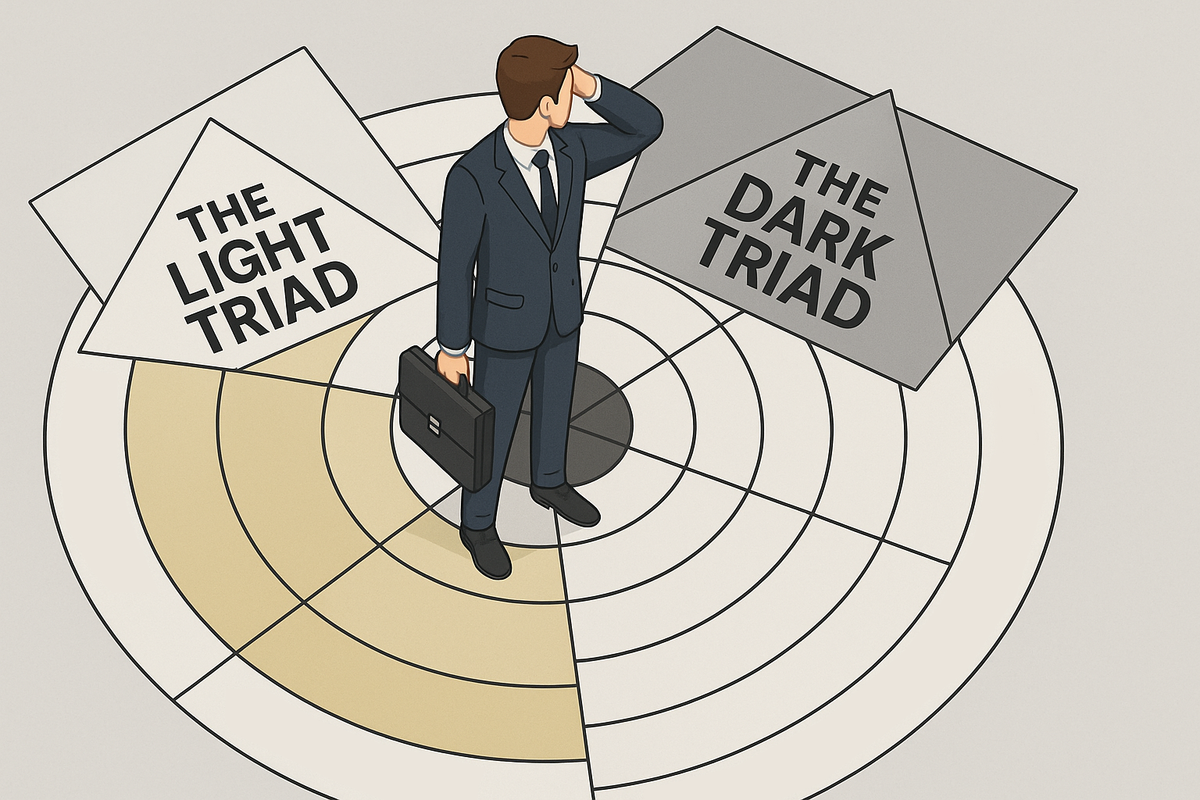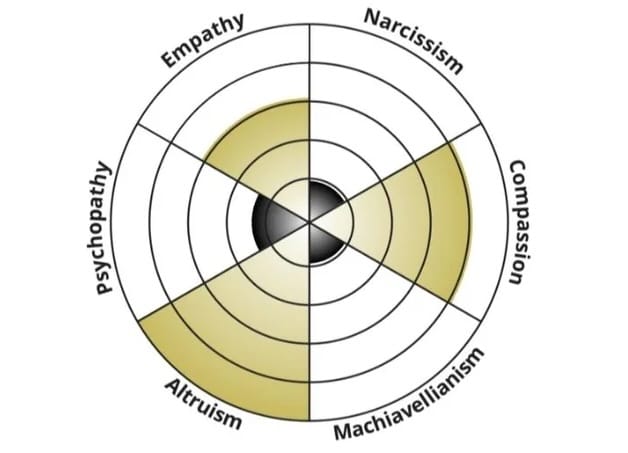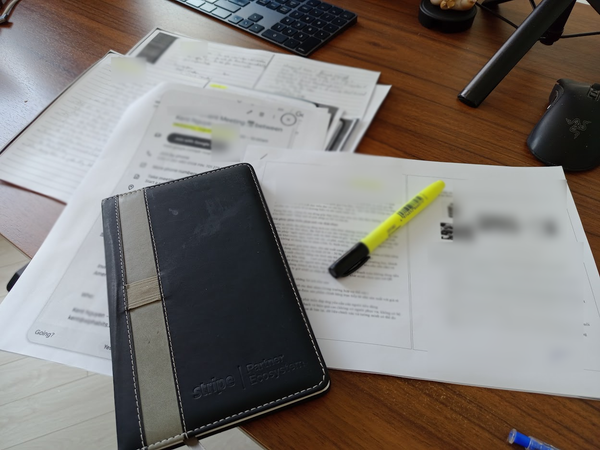Understanding Founder's Psychology with the Light & Dark Triad framework
I want to offer a fresh perspective, a call for deeper self-awareness among founders and a more sophisticated approach to assessment for investors and co-founders.

To my fellow founders, investors, and ecosystem builders in Southeast Asia and beyond: the last few years have been a rollercoaster. We've celebrated incredible successes, witnessed unicorn valuations, and felt the buzz of innovation transforming our region. But alongside the triumphs, we've also seen shadows lengthen. High-profile cases of alleged deception, from the controversies surrounding companies like eFishery to other troubling instances across S.E.A., have cast a pall over the ecosystem, eroding trust and forcing uncomfortable questions.
I speak not as an observer, but as someone who has navigated these turbulent waters firsthand. My own journey with the Sand Battery startup, involved navigating complex interpersonal dynamics and ultimately facing situations that raised profound ethical questions – experiences that culminated in legal disputes and a deep personal reckoning about the nature of collaboration and trust in the high-stakes startup world.
These events, both public and personal, serve as stark reminders that traditional Due Diligence is no longer sufficient – focusing solely on market size, traction metrics, and technical expertise. We meticulously analyze business models but often overlook the most critical variable: the psychological makeup of the founders themselves. We celebrate charisma and bold vision, but fail to look deeper at the underlying personality structures that drive behavior, especially under pressure.
When deception occurs, when partnerships implode acrimoniously, when toxic cultures lead to burnout and failure, it's rarely just about a flawed business plan. More often, it stems from the complex interplay of founder personalities, motivations, and, sometimes, the darker aspects of human nature. The pressure-cooker environment of startups doesn't just reveal character; it amplifies it.
This is why I believe we urgently need a more sophisticated lens for understanding founder psychology. We need to move beyond surface-level assessments and explore frameworks that help us recognize both the constructive and potentially destructive patterns at play.
I've been exploring alternative frameworks that offer a more nuanced lens, drawing inspiration from the work of researchers like Delroy Paulus, Kevin Williams, and Scott Kaufman, and the insightful commentary of experts like Dr. Ramani Durvasula. Specifically, the concepts of the Light Triad and Dark Triad provide a powerful, sometimes uncomfortable, way to think about the personality dynamics that shape our teams, our cultures, and ultimately, our success or failure.
These are not simplistic labels, together they offer full spectrums of traits that exist, to some degree, in all of us. My goal here isn't to pathologize or categorize founders into neat boxes. Instead, I want to offer a fresh perspective, a call for deeper self-awareness among founders and a more sophisticated approach to assessment for investors and co-founders. Understanding these dynamics helps in building healthier, more resilient, more sustainable, and ultimately more impactful and investable ventures.
Understanding the Light Triad in the Startup World: The Empathetic Visionary

Let's start with the characteristics often associated with positive leadership and healthy team dynamics. The Light Triad, as conceptualized by Scott Kaufman and his colleagues, offers a framework for understanding pro-social, humanistic personality traits. It comprises three core elements:
- Kantianism: This isn't about being a philosophy professor, but about embodying Immanuel Kant's principle of treating people as ends in themselves, not merely as means to an end. Founders high in this trait genuinely see the inherent value in their team members, customers, and partners, beyond their utility to the startup's immediate goals. They operate with a sense of ethical duty and respect for individual autonomy.
- Humanism: This involves a deep-seated belief in the dignity and worth of every individual. It manifests as empathy, compassion, and a focus on collective well-being. Humanistic founders strive to create environments where people feel valued, respected, and psychologically safe.
- Faith in Humanity: This is a fundamental belief in the inherent goodness of people. It's an optimistic worldview that assumes positive intent and trusts in the potential for collaboration and mutual support. Founders with this trait often approach partnerships and team-building with openness and trust.
In the high-stakes environment of a startup, these Light Triad traits can be powerful assets, manifesting in tangible, positive behaviors:
- Kantianism in Action: Imagine a founder who actively mentors a junior employee, investing significant time in their development, even knowing this might prepare them for a role outside the company. This founder prioritizes the individual's growth journey over short-term retention. Another example is resisting user-exploitative growth hacks or dark patterns, even if they promise quick wins, because they fundamentally respect user autonomy and well-being. They build products for people, not just off them.
- Humanism in Action: Consider a founder facing the incredibly difficult decision of layoffs. While the business reality necessitates cuts, a humanistic founder handles the process with maximum empathy, transparency, and support, offering generous severance, outplacement help, and genuine care for those departing. They consistently choose ethical paths, even when more profitable shortcuts exist, because they value the company's integrity and its impact on stakeholders. They actively foster psychological safety, encouraging open dialogue and dissent without fear of retribution.
- Faith in Humanity in Action: This founder readily extends trust to co-founders and early hires, empowering them with significant responsibility. They maintain infectious optimism during inevitable setbacks, rallying the team by focusing on shared purpose and belief in collective capability. They genuinely believe in the positive impact their startup aims to achieve, and this belief fuels their resilience and inspires others.
The Upside and the Shadow:
Startups led by founders strong in Light Triad traits often benefit from exceptionally strong company cultures, high employee loyalty, reduced turnover, and a positive external reputation. Their ethical grounding can attract mission-aligned talent and investors. Their optimism and belief in people can foster remarkable resilience in the face of adversity.
However, as Dr. Ramani Durvasula points out, in one of her videos, an overabundance of Light Triad traits, untempered by healthy boundaries and assertiveness, can create vulnerabilities. The very qualities that make these founders admirable can also make them susceptible:
- Naivete and Exploitation: An unwavering faith in humanity can lead to misplaced trust, making them targets for manipulative partners, investors, or even employees (often those higher in Dark Triad traits).
- Excessive Guilt: The deep sense of responsibility (Kaufman's "omnipotent responsibility") can morph into debilitating guilt. They might struggle to make necessary but unpleasant decisions (like firing underperformers or pivoting away from a failing product) because they feel overly responsible for everyone's feelings and outcomes. This can paralyze the company.
- Vulnerability to Manipulation: Their desire to see the good in others and their aversion to conflict can make them susceptible to guilt trips and manipulation, keeping them stuck in unproductive or even abusive professional relationships.
- Lack of Assertiveness: While optimistic and kind, they may lack the necessary assertiveness to negotiate fiercely, defend the company's interests aggressively, or confront problematic behavior directly.
Recognizing the Dark Triad in the Startup Ecosystem: The Ruthless Innovator?

Now, let's turn to the other end of the spectrum. The Dark Triad, originally described by Paulus and Williams, combines three less savory, often antagonistic traits:
- Machiavellianism: Named after Niccolò Machiavelli, this involves manipulativeness, strategic exploitation of others, cynicism, and a focus on self-interest and power above all else. It's about playing the game, often unscrupulously, to win.
- Narcissism (Subclinical): Characterized by grandiosity, entitlement, a constant need for admiration, dominance, and a lack of empathy. The focus is on maintaining a superior self-image and extracting validation from others.
- Psychopathy (Subclinical): Marked by high impulsivity, thrill-seeking, low empathy, low anxiety, and callousness. In a startup context, this doesn't necessarily mean criminality, but rather a willingness to take extreme risks, disregard rules and consequences, and act without remorse.
It's crucial to emphasize we're often talking about subclinical traits – tendencies and patterns, not necessarily full-blown personality disorders. However, even at subclinical levels, these traits can profoundly shape a founder's behavior and the startup environment:
- Machiavellianism in Action: Picture a founder who masterfully plays investors off against each other to inflate valuation, sharing misleading information strategically. They might use charm and flattery purely as tools to extract resources or loyalty from employees, only to discard them when they're no longer useful. They might subtly undermine a co-founder to consolidate power or take credit for joint work. (Self-reflection: Even I, striving to operate ethically, can recognize moments, particularly when fighting for what I believe is right or seeking justice after being wronged, where a calculated, strategic, almost Machiavellian edge emerges. The critical difference lies in self-awareness – recognizing this tendency, understanding its roots, and ensuring it doesn't become the default operating mode or cross ethical lines.)
- Narcissism in Action: This founder might be obsessed with personal press coverage, prioritizing their own image over the company's substance. They might react with rage or defensiveness to any critical feedback, however constructive. They often take sole credit for team successes while blaming others for failures. The startup becomes less about the mission and more about serving as a stage for their perceived greatness.
- Psychopathy (Subclinical) in Action: This could manifest as a founder making incredibly reckless, impulsive pivots without consulting the team or considering the consequences for users or investors. They might show a chilling lack of remorse after betraying a partner or causing significant harm to employees' careers. They might thrive in chaotic, high-conflict environments and consistently bend or break rules, agreements, and promises with little apparent concern.
The Allure and the Danger:
Why do founders with Dark Triad traits sometimes achieve significant success, at least initially? As Kaufman and Dr. Ramani note, there's a superficial allure. Stripped of the antagonism, what remains can look like positive leadership qualities:
- Assertiveness: Their willingness to push boundaries and demand what they want can be mistaken for strong leadership.
- Charisma: Narcissistic individuals, in particular, can be incredibly charming and persuasive, drawing people into their orbit.
- Decisiveness & Risk-Taking: Their low anxiety and impulsivity can appear as bold, decisive leadership, unafraid to take necessary risks.
- Coolness Under Pressure: Their lower anxiety levels might allow them to remain outwardly calm in crises (though this can also be coldness).
However, this perceived strength is often built on a foundation that is ultimately destructive. The long-term consequences of Dark Triad leadership typically include:
- Toxic Work Environments: Fear, manipulation, and lack of psychological safety become the norm.
- High Turnover: Talented individuals refuse to tolerate the toxic dynamics.
- Ethical Lapses & Scandals: The focus on self-interest and disregard for rules inevitably leads to ethical breaches, potentially causing legal issues and reputational ruin.
- Burnout: The constant stress and instability take a heavy toll on everyone involved.
- Eventual Implosion: While some Dark Triad-led ventures achieve short-term success, their internal instability often leads to collapse.
Profiling Beyond the Surface: Asking the Right Questions, Observing the Patterns
Given the complexities and the potential for both Light and Dark traits to be misread, how can we – as founders, co-founders, or investors – gain a deeper understanding? It requires moving beyond surface impressions and asking more probing questions, focusing on behavioral patterns and, crucially, self-awareness.
Remember, these are traits on a spectrum. Very few people are purely Light or purely Dark. The goal isn't to label but to understand the dominant tendencies and how they play out under pressure.Instead of relying solely on curated success stories, try exploring these areas:
- Handling Failure and Conflict: "Tell me about a time you faced a significant setback or a major conflict within a team. What was the situation, how did you react emotionally and behaviorally, and what did you learn about yourself from that experience?" Why this helps: This probes for accountability, empathy, and learning orientation (Light) versus defensiveness, blame-shifting, and lack of introspection (Dark).
- Core Motivations: "Beyond the potential financial upside, what truly drives your commitment to this specific venture day after day? What kind of impact do you genuinely hope to have on your users, your team, and the world?" Why this helps: This explores the balance between intrinsic, humanistic motivations (Light) and extrinsic drivers like power, status, or ego-gratification (Dark).
- Difficult Relationships: "Think about a past professional relationship – with a co-founder, investor, or key employee – that ended badly. From your perspective, what happened, and what role, if any, did you play in how things unfolded?" Why this helps: This assesses self-awareness, the capacity for reflection, and the tendency towards manipulation or victimhood narratives (Dark) versus acknowledging complexity and personal contribution (Light).
- Self-Awareness of Weaknesses: "What are your biggest strengths and weaknesses as a leader, especially when you're under intense pressure? Are there any 'darker' or less constructive tendencies you know you possess and have to consciously manage?" Why this helps: This directly assesses self-awareness and honesty. A founder comfortable acknowledging potential downsides (even mild ones) shows more maturity than one who presents a flawless facade (often a narcissistic trait).
It's not just about the answers themselves, but how they are answered. Look for consistency between words and known actions. Observe patterns over time. Understand the founder's narrative – how do they frame their own story? Most importantly, gauge their level of genuine self-awareness regarding their own psychological landscape. Do they demonstrate insight into their own patterns, both positive and negative?
Alignment, Misalignment, and the Dangerous Dance
Understanding these tendencies isn't just academic; it's critical for assessing fit and potential risks.
- Alignment Check: How do a founder's dominant traits align with the startup's mission, stated values, and current stage? A company building trust-based community software might struggle if led by a highly Machiavellian founder. A venture requiring meticulous, patient execution might be derailed by a founder high in psychopathic impulsivity.
- Role Fit: Do the founder's traits suit the specific demands of their role? A highly agreeable, conflict-avoidant founder (Light Triad leaning) might excel at building early team cohesion but struggle during aggressive M&A negotiations. Conversely, a highly dominant, narcissistic founder might alienate key partners needed for collaborative growth.
- Team Dynamics – The Critical Factor: Perhaps most importantly, how do the traits of the founding team members interact? Dr. Ramani explicitly warns about the dangerous dynamic where Light Triad individuals, with their optimism and desire to see the good, become entangled with and exploited by Dark Triad partners. The Light Triad founder keeps making excuses, trying to fix" the Dark Triad partner, often enabling destructive behavior while feeling increasingly guilty and depleted themselves. This dynamic is incredibly common in failed co-founder relationships and toxic startup environments.
Therefore, assessing individual founders isn't enough; understanding the interplay between co-founders' psychological profiles is paramount. A team composed entirely of highly agreeable Light Triad founders might struggle with tough decisions and external pressures. Conversely, a team dominated by Dark Triad traits is a ticking time bomb. Finding a balance, often with individuals who possess Light Triad foundations but have developed healthy boundaries and assertiveness, is frequently key to long-term stability and success.
Conclusion: Towards Healthier Startup Ecosystems
Profiling founders is an inherent part of the startup ecosystem. Investors need to assess risk and potential; co-founders need to evaluate compatibility; and we, as founders, need deep self-awareness to lead effectively and build sustainable ventures. However, relying solely on traditional metrics like technical skills, past exits, or superficial personality quizzes provides an incomplete, often misleading picture.
By incorporating an understanding of frameworks like the Light and Dark Triads, we can move towards a more sophisticated, nuanced, and ultimately more effective approach. This isn't about applying rigid labels or playing armchair psychologist. It's about recognizing patterns, asking deeper questions, fostering self-reflection, and understanding the profound impact these underlying psychological dynamics have on decision-making, team culture, ethical conduct, and long-term viability.
For founders, the journey starts with radical self-honesty. Where do you see yourself on these spectrums? What are your default tendencies under pressure? Are you aware of your potential vulnerabilities (like the Light Triad's susceptibility to guilt) or your potentially harmful patterns (like the Dark Triad's manipulativeness)? Seeking feedback, engaging in therapy, or working with an executive coach can be invaluable tools for developing this crucial self-awareness.
For investors and co-founders, the task is to look beyond the charisma and the pitch deck. Observe behavior over time. Ask questions that probe character, self-awareness, and interpersonal history. Pay attention to how founders treat others, especially those with less power. Assess the team dynamics – is there mutual respect and psychological safety, or underlying tension and manipulation
Ultimately, embracing this deeper level of psychological understanding is about actively fostering healthier, more resilient, and more ethically grounded startups. Recognizing that the human element is not a soft skill but the fundamental core of any successful venture. By paying closer attention to the interplay of Light and Dark, we can build companies that are not only financially successful but also humanly sustainable.
What is your Light & Dark traits?

I found this interesting 36 questions test for Light & Dark Triad traits, perhaps you could try it out: https://www.idrlabs.com/light-triad-dark-triad/test.php
Let me know what you think, sign up as free member to leave a comment.




